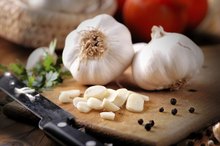Inulin Vs. Psyllium
Fiber is an important part of your diet. Soluble fiber swells to form a gel-like substance when it comes in contact with water. Soluble fiber supplements are used by many to improve their digestive health. Inulin and psyllium are commonly used forms of soluble fiber but they differ in many ways.
Sources
Psyllium fiber comes from the Plantago ovata plant. The plant produces up to 15,000 seeds, all of which are coated in psyllium husk. Psyllium is generally found in fiber supplements. Inulin is found in many foods, such as bananas, asparagus, onions, leeks, garlic and wheat. Inulin is extracted from chicory root and other herbs and may be used as an additive in food.
- Psyllium fiber comes from the Plantago ovata plant.
- Inulin is found in many foods, such as bananas, asparagus, onions, leeks, garlic and wheat.
Effects on Intestinal Bacteria
Inulin Fiber Side Effects
Learn More
The human intestines naturally contain some bacteria that do not cause infections but instead play important roles in digestion, metabolism and immunity. Substances that serve as food sources for these bacteria are known as prebiotics. Inulin is a particularly effective prebiotic, Med Herb explains, as it can be rapidly broken down by these bacteria and promotes their growth. Although in theory psyllium fiber could have similar properties, a 2008 article in the "Journal of Clinical Gastroenterology" determined that psyllium did not promote growth of intestinal bacteria.
- The human intestines naturally contain some bacteria that do not cause infections but instead play important roles in digestion, metabolism and immunity.
Other Benefits
Both inulin and psyllium are forms of soluble fiber. One of the main benefits of adding soluble fiber to your diet is that it adds bulk to stool, helping to relieve constipation. Soluble fiber absorbs excess water in your digestive tract, helping to prevent loose watery stools. Increasing your soluble fiber intake also aids in controlling your cholesterol and blood glucose levels, the University of Maryland Medical Center notes. Psyllium is more effective in these aspects because it does not get broken down by intestinal bacteria.
- Both inulin and psyllium are forms of soluble fiber.
- Soluble fiber absorbs excess water in your digestive tract, helping to prevent loose watery stools.
Side Effects
Wheat Dextrin & Fiber
Learn More
Both psyllium and inulin cause some gastrointestinal side effects, such as bloating, gas and nausea. This is more likely if you are not accustomed to eating a high fiber diet. When inulin is broken down by bacteria, gas forms, which exacerbates some of these symptoms. If you have trouble with inulin or psyllium, switching to the other fiber source may alleviate your symptoms.
- Both psyllium and inulin cause some gastrointestinal side effects, such as bloating, gas and nausea.
- If you have trouble with inulin or psyllium, switching to the other fiber source may alleviate your symptoms.
Related Articles
References
- "Journal of Clinical Gastroenterology"; Evaluation of Prebiotic Potential of Refined Psyllium (Plantago ovata) Fiber in Healthy Women; Elli et. al.; September 2008
- University of Maryland Medical Center: Psyllium
- MedHerb.com: Inulin
- "British Journal of Nutrition"; Introducing Inulin-Like Fructans; Roberfroid Marcel; 2005.
- Bruma Jose M. Satiety effects of psyllium in healthy volunteers. Appetite. Volume 105, 1 October 2016, Pages 27-36. doi:10.1016/j.appet.2016.04.041
- Lever E, Cole J, Scott SM, Emery PW, Whelan K. Systematic review: the effect of prunes on gastrointestinal function. Aliment Pharmacol Ther. 2014;40(7):750-8. doi:10.1111/apt.12913
- de Bock M, Derraik JG, Brennan CM, et al. Psyllium supplementation in adolescents improves fat distribution & lipid profile: a randomized, participant-blinded, placebo-controlled, crossover trial. PLoS One. 2012;7(7):e41735. doi:10.1371/journal.pone.0041735
- Lambeau KV and Johnson W. McRorie, Jr. Fiber supplements and clinically proven health benefits: How to recognize and recommend an effective fiber therapy. J Am Assoc Nurse Pract. 2017 Apr; 29(4): 216–223. doi:10.1002/2327-6924.12447
- Moayyedi P, Quigley EM, Lacy BE, et al. The effect of fiber supplementation on irritable bowel syndrome: a systematic review and meta-analysis. Am J Gastroenterol. 2014;109(9):1367-74. doi:10.1038/ajg.2014.195
- Gibb RD, McRorie JW Jr, Russell DA, Hasselblad V, D'Alessio DA. Psyllium fiber improves glycemic control proportional to loss of glycemic control: a meta-analysis of data in euglycemic subjects, patients at risk of type 2 diabetes mellitus, and patients being treated for type 2 diabetes mellitus. Am J Clin Nutr. 2015 Dec;102(6):1604-14. doi:10.3945/ajcn.115.106989
- Proctor & Gamble. Metamucil.
- Food Information Council Foundation. Fiber Fact Sheet.
- El-Salhy Magdy, et al. Dietary fiber in irritable bowel syndrome (Review). Int J Mol Med. 2017 Sep; 40(3): 607–613. doi:10.3892/ijmm.2017.3072
- University of California San Francisco. Increasing Fiber Intake.
Writer Bio
Adam Cloe has been published in various scientific journals, including the "Journal of Biochemistry." He is currently a pathology resident at the University of Chicago. Cloe holds a Bachelor of Arts in biochemistry from Boston University, a M.D. from the University of Chicago and a Ph.D. in pathology from the University of Chicago.








